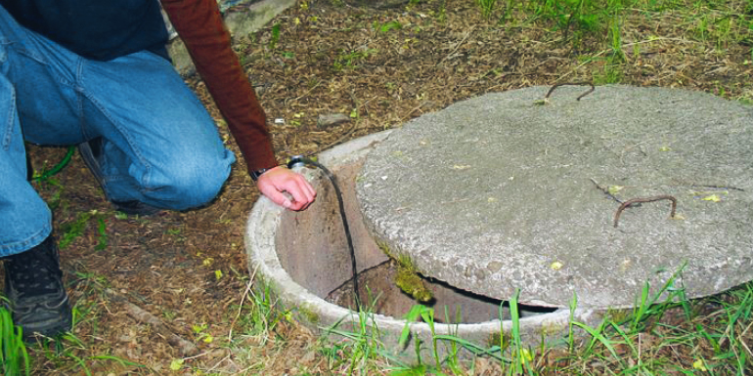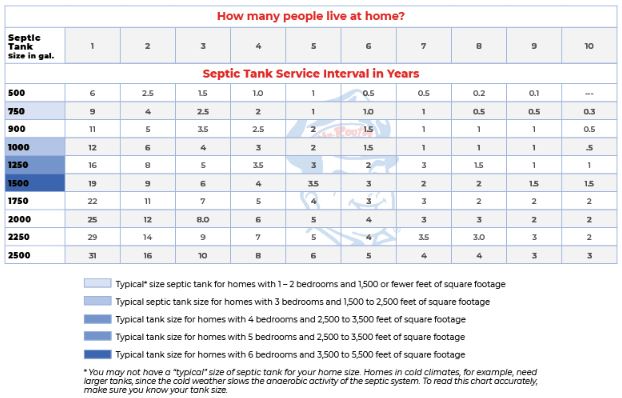
Mr. Rooter Plumbing explains septic tank pumping frequency and maintenance.
|
Understanding Septic Tank Maintenance
Out of sight, out of mind. Pumping your septic tank is one of the easiest home maintenance tasks to forget about. The septic tanks are buried, and the access port is usually covered in dirt and hard to access!
However, this crucial maintenance task will help you avoid smelly and expensive septic tank or drain field repairs. Regular septic tank pump out can mean that septic tanks last decades and provide reliable sewage treatment. If you’re unsure how often to pump a septic tank, you can learn that information (and more) below.
How Often Should a Septic Tank Be Pumped?
Many people ask how often they should pump a septic tank because they want to take care of them so they last the distance. There is no single answer to this question. Instead, multiple factors can contribute.
Factors Affecting Septic Tank Pumping Frequency
From your household size to how big your septic tank is, you may be surprised by how many factors contribute to when you should pump the septic tank on your property.
Household Size
The more people that produce waste in your home, the more frequently you may need to consider pumping septic tanks on your property.
Septic Tank Size
Septic tanks come in all different sizes to suit varying needs. If you have a small family and a large tank, you may need to book a septic tank pump service far less often than a large family with a small tank.
Volume of Solids in Wastewater
The more solids in your wastewater, the fuller your septic tank can be, and the more frequently you need to book a septic tank pump out with a trusted expert like Mr. Rooter Plumbing®.
Septic System Age and Condition
You may like to have your septic tank pumped more frequently if you have an older septic system that may not be in the best condition. Your chosen pump tank septic service professionals can inspect all system components, such as your septic tank pump, to ensure they’re in good working order.
Septic Tank Pumping Frequency Chart
Use the chart below to find the correct service interval for your septic tank pump out. Remember: This chart is a guide and not a fail-safe. Some states, cities, or counties may have minimum septic tank requirements regardless of your home size.

How Do You Know When Your Septic Tank Is Full?
Hopefully, you’re suspicious of a full septic tank before your yard is flooded with sewage. There are a number of ways to tell that you need to pump a septic tank sooner rather than later!
Signs Your Septic Tank Needs Pumping
If you can relate to any of these signs, contact Mr. Rooter Plumbing® to have your septic tank pumped as soon as possible.
- The drains in your home are backing up
- There are foul odors, sewage smells, or standing water outside your home, which can indicate septic tank failure
- You have clogged pipes or sewer blockages, sometimes pointing to septic tank problems that require a professional diagnosis.
If none of these symptoms are present, locate your septic tank access port. Put on gloves, protective clothing, and eyewear for safety, and then insert a 6’ – 10’ wooden rod vertically into the septic tank. If the sludge is more than one-third full, it’s time to pump your septic tank!
How Long Does It Take to Pump a Septic Tank?
As a general rule, the larger your septic tank is, the longer it can take to pump. Ask your local Mr. Rooter Plumbing® septic tank pumping professional for an approximate timeframe. You can typically expect to pump 1,000 gallons per 20-30 minutes.
How to Maintain a Healthy Septic System
Maintaining a healthy septic system is easier than you think. Your care routine can start with knowing that all water that exists in your home goes through the septic system. This may make you mindful of how you use your shower, kitchen, laundry, and toilet.
- Use less sink water
- Take faster showers
- Apply nozzles to faucets to limit water flow
- Check for faucet leaks
- Maximize dishwasher and washing machine loads
- Use an efficient toilet
- Don’t treat your toilet like a garbage disposal
- Don’t pour grease down the drain
- Divert rainwater away from the septic drain field
- Keep trees away from your septic system
- Use garbage disposals wisely
- Minimize heavy-duty cleaners
- Use septic-safe products
- Avoid hazardous chemicals
Septic Tank Pumping and Maintenance with Mr. Rooter Plumbing®
Septic tank pumping isn’t a DIY job. Fortunately, Mr. Rooter Plumbing®, a Neighborly company, has all the necessary equipment and expertise to pump your septic tank. If you want to help cut down the required service time, you can locate the septic tank access port and dig it out if it’s buried. Sometimes, this can be a treasure hunt! Call us or request an appointment online with our technicians.

